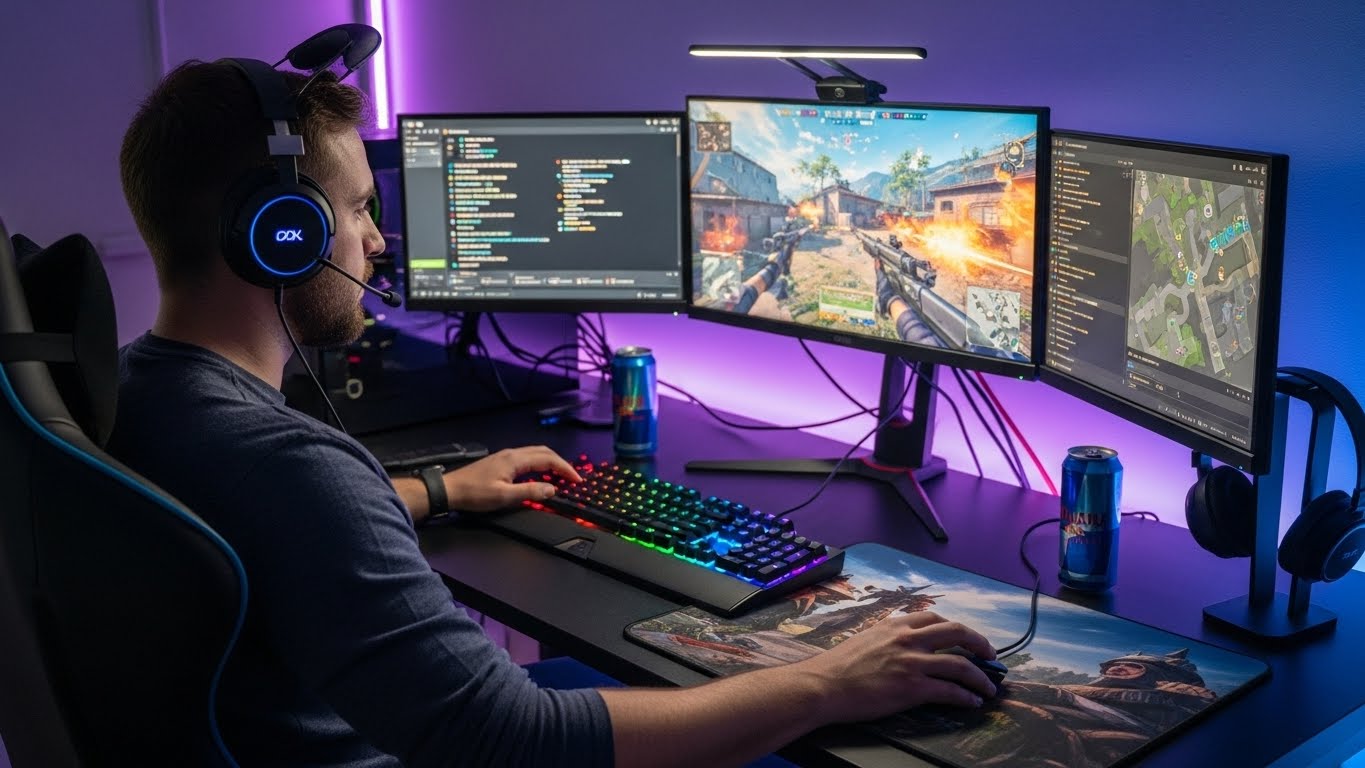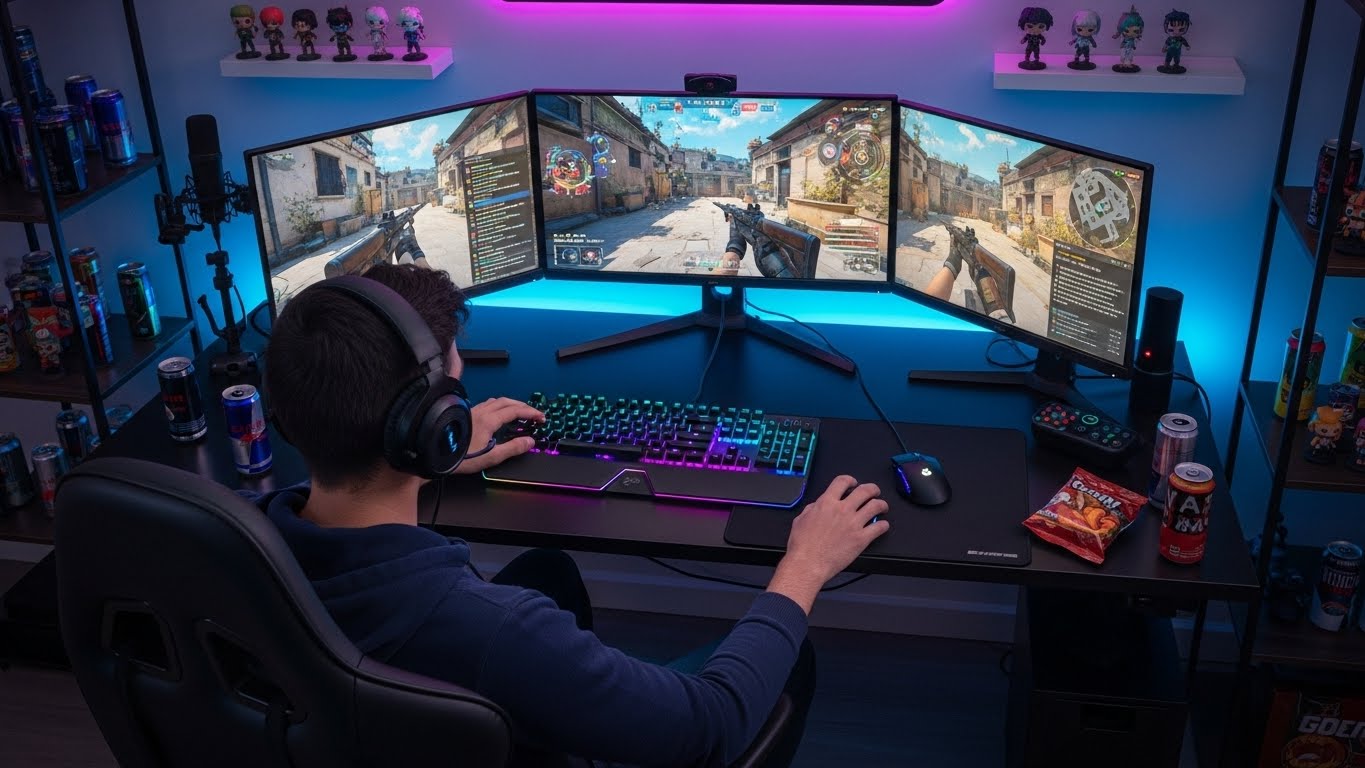Introduction: The Allure of Gaming in the Modern Age
Gaming has grown into one of the most influential cultural phenomena of the 21st century. What was once seen as a niche hobby for the tech-savvy or younger generation has blossomed into a global multi-billion-dollar industry that touches all demographics. From casual mobile games to expansive online multiplayer worlds, gaming offers a diverse range of experiences for people of all ages. But what is it about gaming that captivates so many? Is it the challenge, the escapism, or the sense of connection? This post dives into the world of gaming and explores how virtual experiences are now shaping our real lives in unexpected ways.
The Evolution of Gaming: From Pixels to Immersive Realities
The journey of gaming from simple pixelated screens to highly immersive experiences has been nothing short of remarkable. Early video games like Pong and Space Invaders were groundbreaking for their time, offering players a form of entertainment that was interactive and engaging. These rudimentary games were just the beginning, and as technology evolved, so did the possibilities within the gaming world.
In the 1990s, 3D graphics and more complex gameplay changed the gaming landscape forever. Titles like Super Mario 64 and The Legend of Zelda: Ocarina of Time demonstrated how video games could offer not just challenges, but rich, expansive worlds to explore. Fast-forward to today, and gaming has embraced everything from virtual reality (VR) to sophisticated AI-driven narratives. The boundaries between real and virtual are increasingly blurring, offering experiences that were once relegated to science fiction.
The Rise of Online Gaming: Connecting a Global Community
One of the most significant shifts in the gaming world has been the rise of online multiplayer games. In the past, games were solitary experiences, limited to single-player modes or couch co-op with friends. But the advent of high-speed internet and online multiplayer functionality changed everything. Games like World of Warcraft, Fortnite, and Minecraft have brought millions of players together from around the world, creating a global gaming community that transcends geographical boundaries.
These online platforms are not just places to compete—they’re social spaces where players can connect, collaborate, and build relationships. Whether it’s working as a team to defeat enemies, creating entire worlds in Minecraft, or attending live virtual concerts in Fortnite, online gaming has become as much about community and social interaction as it is about gameplay. The sense of belonging and camaraderie that online gaming fosters has transformed it into a form of entertainment that goes far beyond just playing a game.
Mobile Gaming: The Era of Gaming in Your Pocket
In the past decade, mobile gaming has revolutionized how people engage with games. The rise of smartphones has brought gaming into our pockets, allowing us to play anywhere and anytime. Mobile games like Candy Crush, Pokémon GO, and Clash Royale have made gaming accessible to a wider audience, offering simple but addictive experiences that anyone can enjoy.
What makes mobile gaming unique is its accessibility. Players don’t need expensive gaming consoles or PCs to dive into games. All it takes is a smartphone and a few minutes to spare. This accessibility has opened gaming to millions of casual gamers who wouldn’t consider themselves “hardcore” players but enjoy a quick game during their commute or while relaxing at home. Mobile gaming has also introduced new types of gaming experiences, such as augmented reality (AR) games, which combine the virtual world with the real world in fun and innovative ways.
The Impact of Esports: From Hobby to Profession
While casual gaming has become widely popular, another side of gaming has emerged in the form of esports. Esports is competitive gaming, where skilled players compete in tournaments for cash prizes, sponsorships, and even college scholarships. What started as small-scale events has grown into a massive industry, with professional leagues, international tournaments, and millions of spectators.
Esports has turned gaming into a legitimate career path. Players can now make a living off of their gaming skills, and teams have dedicated coaches, analysts, and managers to help them perform at their best. Games like League of Legends, Dota 2, and Counter-Strike: Global Offensive have become more than just games—they are platforms for global competition with audiences comparable to traditional sports events. As esports continues to grow in prominence, we can expect it to become a mainstay in the entertainment industry.
The Art and Storytelling in Games
Beyond gameplay and competition, games have also become a platform for storytelling and artistic expression. Video games are now able to convey complex narratives and deep emotional experiences, thanks to advances in graphics, sound design, and interactive storytelling. Games like The Last of Us, Red Dead Redemption 2, and The Witcher 3 offer players not just a game but an epic story to engage with.
The art direction in games has also evolved significantly. Game developers now employ talented artists to create visually stunning worlds that rival the best in film and animation. This combination of gameplay and storytelling has elevated gaming to an art form, allowing players to immerse themselves in richly detailed environments, interact with complex characters, and shape the outcome of the story through their decisions. As technology continues to improve, the possibilities for storytelling in games are endless.
Gaming and Mental Health: The Growing Discussion
While gaming has long been associated with entertainment and escape, there is a growing conversation about its impact on mental health. On one hand, gaming can be a great way to relax, reduce stress, and connect with others. Many players use games as a form of self-care, immersing themselves in virtual worlds to unwind after a long day.
On the other hand, excessive gaming can lead to issues such as addiction, social isolation, and even negative impacts on sleep patterns. It’s important for players to find a healthy balance and be aware of the potential for overindulgence. Fortunately, the gaming community and developers are beginning to acknowledge these concerns, with many creating resources to help players manage their gaming habits. Moreover, mental health awareness in gaming is also being normalized, with more people opening up about their struggles and using gaming as a platform for positive change.
The Future of Gaming: What’s Next?
The future of gaming is as exciting as it is uncertain. With the development of new technologies like virtual reality (VR), augmented reality (AR), and cloud gaming, the boundaries of what gaming can be are expanding. Imagine a future where games are no longer confined to screens, where players can step into fully immersive virtual worlds, or where they can play high-quality games instantly via the cloud, without needing expensive hardware.
Moreover, gaming is likely to become more inclusive and diverse. The increasing representation of women, people of color, and LGBTQ+ individuals in gaming, both as players and developers, is pushing the medium toward a more inclusive future. As gaming continues to grow, it will reflect a wider range of experiences and identities, enriching the gaming world for everyone.
Conclusion: The Ever-Expanding World of Gaming
From its humble beginnings to its place in the cultural mainstream, gaming has proven to be more than just a passing trend—it is a powerful form of entertainment, community, and artistic expression. Whether through online multiplayer experiences, mobile gaming, or immersive storytelling, games have evolved into a global force that touches all aspects of our lives. As technology continues to advance and gaming continues to push boundaries, one thing is certain: the world of gaming will only grow bigger and more exciting.
Gaming is not just a pastime; it’s a cultural phenomenon, a form of expression, and a powerful tool for connection. Whether you’re playing for fun, competing professionally, or engaging with friends, the world of gaming has something for everyone—and its influence will continue to shape the future of entertainment for years to come.



